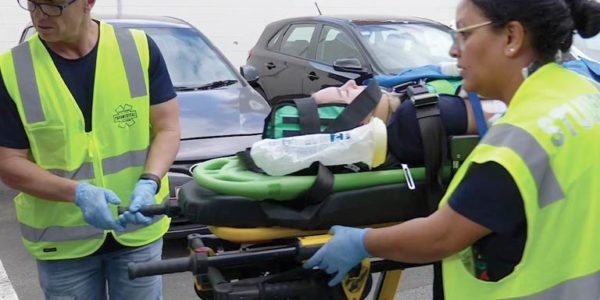What is a Patient Transport Officer (PTO)?
A Patient Transport Officer (PTO) is responsible for providing transport for patients to and from medical facilities. Additionally, they are in charge of maintaining and operating patient transport vehicles and providing excellent customer service to patients.
The interactions a patient has with a PTO can make a huge difference in their medical care experience, putting them at ease and ensuring they feel cared for.
Becoming a PTO could be a rewarding career path if you have a positive, outgoing personality, enjoy driving and connecting with a range of people from different generations, cultures and backgrounds.
Typical duties of a PTO
- Transport patients and equipment, including wheelchairs, stretchers
- Assist patients during discharge and admissions for medical facilities, providing physical assistance and opening doors
- Be comfortable driving a range of manual and automatic vehicles
- Maintain vehicles and transportation devices; how you look after your vehicle is a direct reflection of the standard of patient care you’ll deliver
- Keep accurate patient records, provide support to other medical staff
Average PTO salary
PTOs in Australia can earn between $55,000 – $67,000 per year*.
*Talent.com (2024)
How to become a PTO
Australian Paramedical College can help you gain the fundamental skills needed to start a rewarding career in Non-Emergency Patient Transport (NEPT).
A HLT31120 – Certificate III in Non-Emergency Patient Transport will allow you to become a Patient Transport Officer (PTO) as soon as you graduate.
To perform more advanced patient care as a Ambulance Transport Attendant (ATA), sometimes called an Emergency Medical Technician (EMT), the HLT41120 – Certificate IV in Health Care is required, but the HLT5120 – Diploma of Emergency Health Care could give you an edge when applying for roles in the industry.
Learn moreCert III mum becomes a qualified PTO
Tasha had worked in the family business for 11 years while raising two kids, and wanted to start something for herself. Patient Transport felt like a good fit so she enrolled in APC’s HLT31120 Certificate III in Non-Emergency Patient Transport.
After completing the Clinical Workshop Tasha landed a PTO job with our Industry Partners, Medical Edge Australia!
“I love being out on the road, meeting new people, attending different healthcare facilities, and that no two days are ever the same!”
PTO skillset and qualities
Effective communication
Being able to connect and communicate with patients is an important skillset for Patient Transport Officers
Empathy & patient care
Patient Transport Officers need to demonstrate compassion on a day-to-day basis who may be feeling vulnerable
Collaborative
Values teamwork and effectively collaborates with other ambulance services, hospital staff and the local community when assisting with patient transfers


